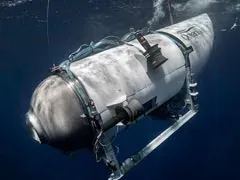Stockton Rush had been attempting to persuade Las Vegas-based investor Jay Bloom for a year to acquire a few spots on his company's submersible. Rush wanted Bloom and his son to have the incredible opportunity to explore the deep-sea wreck of the Titanic, a once-in-a-lifetime experience. In an interview on Friday, Bloom expressed his intrigue. His son, Sean, who is now 20 years old, had been captivated by the story of the ill-fated British passenger liner since childhood.
As Bloom delved deeper into researching the Titan submersible, his concerns about its safety grew. Consequently, when presented with a last-minute opportunity to join the final expedition of the season, Bloom politely declined, citing scheduling conflicts. Instead, the two available seats on board were taken by Pakistani-born magnate Shahzada Dawood and his son, Suleman. Tragically, Rush, along with two others, lost their lives this week when the Titan imploded in the depths of the Atlantic.
The recent loss of his good friend, actor Treat Williams, in a motorcycle accident less than two weeks prior, made the tragedy all the more poignant for Bloom. It served as a stark reminder of what truly matters in life. Bloom reflected, "Every time I see a picture of that Pakistani businessman and his 19-year-old son, I think how easily that could have been me and my 20-year-old son – but for the grace of God."
Following the announcement by the US Coast Guard that fragments of the Titan had been discovered on the ocean floor, Bloom shared a series of text messages on Facebook between himself and Rush from earlier in the year. In those messages, Rush dismissed any concerns about the danger of the trip. He asserted that, despite obvious risks, the experience was much safer than flying in a helicopter or even scuba diving. Rush claimed that there hadn't been any injuries on a non-military submersible in 35 years. However, Bloom, who possessed a private helicopter license, remained unconvinced. He harbored particular worries about the consumer-grade parts used in the Titan, such as a video game joystick for vessel control, and the unique carbon-fiber hull. Additionally, the fact that passengers couldn't open the Titan from the inside during an emergency left him feeling "spooked."
Guillermo Söhnlein, Rush's co-founder of OceanGate since 2009, stated that Rush was well aware of the perils associated with exploring the depths of the ocean and maintained a highly cautious approach towards risk. However, questions about the safety of the Titan's design had been raised by industry experts and a former employee of Rush's company as far back as 2018.
Rush's unwavering confidence remained unshakeable, according to Bloom. Reflecting on their interaction, Bloom commented, "It was his dream. He's a good guy, I really liked him, and I think he had good intentions. But he became overly convinced by his own beliefs."
